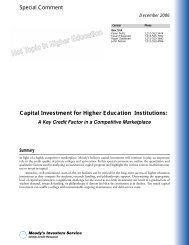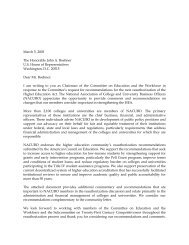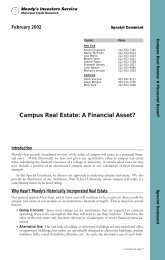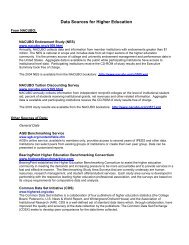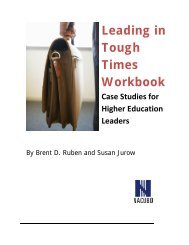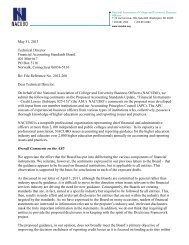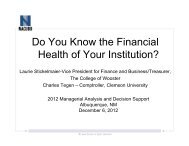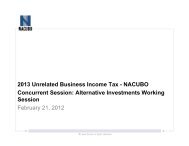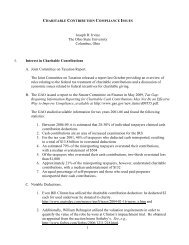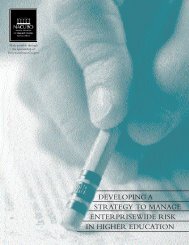International Branch Campuses and Unique Risk ... - NACUBO IRC
International Branch Campuses and Unique Risk ... - NACUBO IRC
International Branch Campuses and Unique Risk ... - NACUBO IRC
Create successful ePaper yourself
Turn your PDF publications into a flip-book with our unique Google optimized e-Paper software.
efforts for a very globally mobile population, while legal<br />
consultants <strong>and</strong> insurance advisors can facilitate a better<br />
underst<strong>and</strong>ing of the local legal <strong>and</strong> insurance system <strong>and</strong><br />
mitigation of the subsequent risks.<br />
Furthermore, dialogue with other entities in the same<br />
operational environment could prove very useful. Other<br />
international branch campuses need not be competitors<br />
<strong>and</strong> may serve as strategic partners for mutual future<br />
success. Even non-academic entities, particularly global<br />
companies with the same country of origin as the home<br />
campus, may be a great resource to branch campus leaders,<br />
enhancing their underst<strong>and</strong>ing of operations in the local<br />
culture <strong>and</strong> context. Lastly, groups such as committees,<br />
task forces, research groups, <strong>and</strong> think tanks, whose focus<br />
is on long-term impacts <strong>and</strong> trends of higher education<br />
<strong>and</strong> the country in general, may provide valuable strategic<br />
insight for sustained future success of the branch campus.<br />
A Look to the Future<br />
As branch campuses increase in number in the international<br />
market, their experiences will continue to inform<br />
discussions <strong>and</strong> improve the ability of higher education<br />
decision makers to make the right choices when considering<br />
whether to establish branch campus agreements with<br />
partners, governments, educational bodies, <strong>and</strong> corporate<br />
entities. Case studies from real experiences will also provide<br />
insights into particular geographical locations <strong>and</strong> the<br />
unique risk implications for those contexts. As the international<br />
higher education market reaches saturation points,<br />
the continued success of established branch campuses<br />
despite the competition may depend on the ability of<br />
home campuses to provide the right kind of support <strong>and</strong><br />
the ability of branch campuses to meet their objectives,<br />
manage exposures to risk, <strong>and</strong> build key relationships with<br />
partners on the ground.<br />
About the Author<br />
Ivana Chalmers has worked at<br />
Northwestern University in Qatar<br />
(NU-Q) since its inaugural year of<br />
2008. NU-Q provides undergraduate<br />
degrees in journalism <strong>and</strong> communications.<br />
With a diverse employee<br />
community <strong>and</strong> students of 24 different<br />
nationalities, this unique environment<br />
results in a one of a kind operational context. Ms.<br />
Chalmers is the risk assessment specialist for the branch<br />
campus.<br />
At NU-Q, Ms. Chalmers’ portfolio encompasses a<br />
wide range of duties in a risk environment where precedents<br />
are rare, established policies may be unsuitable,<br />
<strong>and</strong> the context differs starkly from that of Northwestern’s<br />
home campus. Her role includes assessment of risk exposures<br />
<strong>and</strong> evaluation of insurance needs for the campus,<br />
while serving as a point of contact to internal <strong>and</strong> external<br />
security, legal, <strong>and</strong> risk management stakeholders. She is<br />
a key contact for <strong>and</strong> a member of several security, safety,<br />
<strong>and</strong> emergency management committees.<br />
Before joining NU-Q, Ms. Chalmers worked in the<br />
corporate media industry in London, Engl<strong>and</strong>, <strong>and</strong> Johannesburg,<br />
South Africa.<br />
In 2010, Ms. Chalmers co-published a chapter for a<br />
book, Girl Wide Web 2.0: Revisiting Girls, the Internet <strong>and</strong><br />
the Negotiation of Identity, edited by Sharon Mazzarella,<br />
about young Arab women <strong>and</strong> their use of social networking<br />
sites for expression of identity, entitled “Degrees of<br />
Caution: Arab Girls Unveil on Facebook.” This work was<br />
awarded the honor of ‘top paper’ in its category by the<br />
National Communications Association (NCA), <strong>and</strong> Ms.<br />
Chalmers presented it at the 2010 NCA conference in<br />
San Francisco.<br />
Ms. Chalmers is currently working towards a Strategic<br />
Decision Making <strong>and</strong> <strong>Risk</strong> Management professional certificate<br />
through Stanford University <strong>and</strong> holds a GCMBE<br />
Level II Project Management certificate from Meeting<br />
Professionals <strong>International</strong> (MPI). She graduated top of<br />
her class from Rhodes University in Grahamstown, South<br />
Africa, with a bachelor’s degree in journalism <strong>and</strong> media<br />
studies, specializing in television production.<br />
38 URMIA Journal 2011



